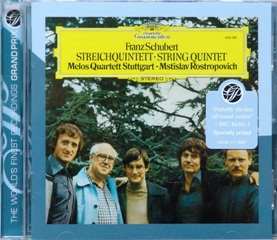Franz Schubert - String Quintet in C Major D. 956 (2007)
Franz Schubert - String Quintet in C Major D. 956 (2007)

I. Allegro ma non troppo II. Adagio III. Scherzo. Presto; Trio. Andante sostenuto play IV. Allegretto Mstislav Rostropovich - Cello Melos String Quartett: Wilhelm Melcher, Ida Bieler, Hermann Voss, Peter Buck.
The String Quintet in C major, D. 956, op. posth. 163, is a piece of chamber music written by Franz Schubert. It was composed during the summer of 1828, two months before his death, and is Schubert's final chamber work. The Quintet was first performed on 17 November 1850 at the Musikverein in Vienna; it was published in 1853. The work is considered one of the greatest chamber music compositions ever written
The work holds the distinction of being the only full-fledged string quintet in Schubert's vast oeuvre. It also stands out for its somewhat unconventional instrumentation, employing two cellos instead of the customary two violas. Most other string quintets follow the example of Mozart and call for an ensemble consisting of the four standard instruments of the string quartet (two violins, viola, and cello), plus a second viola. Schubert, like Luigi Boccherini before him, decided to replace the second viola with an additional cello, thereby enhancing the richness of the quintet texture's lower register. However, Schubert's use of the second cello is very different from Boccherini's, for Boccherini essentially uses the additional cello to create an additional viola line.
The string quintet was completed sometime in September or early October 1828, but it was not published until 1883 or 1884. Schubert submitted it to one of his publishers for consideration, saying that "finally I have written a quintet for 2 violins, 1 viola, and 2 violoncello... the quintet rehearsal will only begin in the next few days. Should any of these compositions by any chance commend themselves to you, please let me know.". Probst replied, asking only to see some of Schubert's vocal works and requesting more popular piano music. Even at this very late stage in Schubert's career, it is obvious that he was regarded as a composer who mainly focused on songs and piano pieces, and was definitely not taken seriously as a chamber music composer.
The violinist Joseph Saunders had the second theme of the first movement carved on his tombstone, and Artur Rubinstein’s wish is to have the second movement played at his funeral.
It is also interesting to note that this piece was composed mere months before Schubert died. For John Reed, the very last chord of the piece anticipates this, ending with a C major chord against a dissonant D-flat. "As Browning's Abt Vogler put it, 'Hark, I have dared and done, for my resting place is found, The C major of this life; so, and now I will try to sleep."
download: uploaded yandex 4shared mediafire solidfiles mega zalivalka filecloudio anonfiles oboom
Last Updated (Monday, 28 April 2014 13:40)








